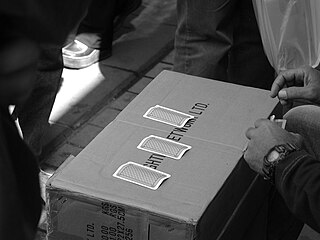 W
WA confidence trick is an attempt to defraud a person or group after first gaining their trust. Confidence tricks exploit victims using their credulity, naïveté, compassion, vanity, irresponsibility, and greed. Researchers have defined confidence tricks as "a distinctive species of fraudulent conduct ... intending to further voluntary exchanges that are not mutually beneficial", as they "benefit con operators at the expense of their victims ".
 W
WA confidence trick is an attempt to defraud a person or group after first gaining their trust. Confidence tricks exploit victims using their credulity, naïveté, compassion, vanity, irresponsibility, and greed. Researchers have defined confidence tricks as "a distinctive species of fraudulent conduct ... intending to further voluntary exchanges that are not mutually beneficial", as they "benefit con operators at the expense of their victims ".
 W
WOn July 15, 2020, between 20:00 and 22:00 UTC, reportedly 130 high-profile Twitter accounts were compromised by outside parties to promote a bitcoin scam. Twitter and other media sources confirmed that the perpetrators had gained access to Twitter's administrative tools so that they could alter the accounts themselves and post the tweets directly. They appeared to have used social engineering to gain access to the tools via Twitter employees. Three individuals were arrested by authorities on July 31, 2020 and charged with wire fraud, money laundering, identity theft, and unauthorized computer access related to the scam.
 W
WAn advance-fee scam is a form of fraud and one of the most common types of confidence tricks. The scam typically involves promising the victim a significant share of a large sum of money, in return for a small up-front payment, which the fraudster claims will be used to obtain the large sum. If a victim makes the payment, the fraudster either invents a series of further fees for the victim to pay or simply disappears.
 W
WThe badger game is an extortion scheme or confidence trick in which the victim is tricked into a compromising position to make them vulnerable to blackmail.
 W
WBanc De Binary was an Israeli financial firm with a history of regulatory issues on three continents. On January 9, 2017, the company announced that it would be closing due to negative press coverage and its tarnished reputation. The firm also surrendered its brokerage license with the Cyprus Securities and Exchange Commission (CySEC) removing its ability to legally trade in the European Union. Its 2014 revenues were reported as $100 million.
 W
WBe2 is a matchmaking service in 37 countries.
 W
WThe blessing scam, also called the ghost scam or jewelry scam, is a confidence trick typically perpetrated against elderly women of Chinese origin. The scam originated in China and Hong Kong and victims have fallen to it worldwide including in Chinatowns and overseas Chinese communities. The object of the scam is to persuade the victim to put valuables into a bag, which the perpetrator then secretly swaps for a different bag, enabling them to take the valuables.
 W
WThe Bofors scandal was a major weapons-contract political scandal that occurred between India and Sweden during the 1980s and 1990s, initiated by Indian National Congress politicians and implicating the Indian prime minister, Rajiv Gandhi, and several other members of the Indian and Swedish governments who were accused of receiving kickbacks from Bofors AB, an arms manufacturer principally financed by the Wallenberg family's Skandinaviska Enskilda Banken, for winning a bid to supply to India their 155 mm field howitzer. The scandal relates to illegal kickbacks paid in a US$1.4-billion deal between the Swedish arms manufacturer Bofors with the government of India for the sale of 410 field howitzer guns, and a supply contract almost twice that amount. It was the biggest arms deal ever in Sweden, and money marked for development projects was diverted to secure this contract at any cost. The investigations revealed flouting of rules and bypassing of institutions.
 W
WBrushing is a deceitful technique sometimes used in e-commerce to boost a seller's ratings by creating fake orders.
 W
WCaller ID spoofing is the practice of causing the telephone network to indicate to the receiver of a call that the originator of the call is a station other than the true originating station. This can lead to a caller ID display showing a phone number different from that of the telephone from which the call was placed.
 W
WEmail fraud is intentional deception for either personal gain or to damage another individual by means of email. Almost as soon as email became widely used, it began to be used as a means to defraud people. Email fraud can take the form of a "con game", or scam. Confidence tricks tend to exploit the inherent greed and dishonesty of its victims. The prospect of a 'bargain' or 'something for nothing' can be very tempting. Email fraud, as with other 'bunco schemes,' usually targets naive individuals who put their confidence in schemes to get rich quickly. These include 'too good to be true' investments or offers to sell popular items at 'impossibly low' prices. Many people have lost their life savings due to fraud.
 W
WFake news is false or misleading information presented as news. It often has the aim of damaging the reputation of a person or entity, or making money through advertising revenue. However, the term does not have a fixed definition, and has been applied more broadly to include any type of false information, including unintentional and unconscious mechanisms, and also by high-profile individuals to apply to any news unfavourable to his/her personal perspectives.
 W
WFortune telling fraud, also called the bujo or egg curse scam, is a type of confidence trick, based on a claim of secret or occult information. The basic feature of the scam involves diagnosing the victim with some sort of secret problem that only the grifter can detect or diagnose, and then charging the mark for ineffectual treatments. The archetypical grifter working the scam is a fortune teller who announces that the mark is suffering from a curse that her magic can relieve, while threatening dire consequences if the curse is not lifted.
 W
WThe Great Reality TV Swindle was a con perpetrated in 2002 by Nik Russian, a British man who, at the time, was working at an entry-level position in a branch of the UK book chain Waterstone's. Russian placed advertisements in major publications that invited people to audition for a year-long reality television programme where they could potentially win a prize of GB£100,000. After receiving hundreds of responses, he auditioned some of them on Raven's Ait in London, then selected 30 successful auditionees to take part, without informing them that no actual program had been commissioned. Telling them that the show would last for an entire year, Russian instructed the participants to leave their homes, quit their jobs and then meet him in London on 10 June, where they would be divided into teams of ten and set their challenge for the next twelve months.
 W
WThe Great Salad Oil Swindle is a book by Wall Street Journal reporter Norman C. Miller about Tino De Angelis, a New Jersey-based wholesaler and commodities trader who dealt in vegetable oil futures contracts. The book was published in 1965 by Coward McCann.
 W
WThe "Con Queen" scam is a long-running and elaborate scam perpetrated by the so-called Hollywood Con Queen, an Indonesian impostor named Hargobind Punjabi Tahilramani who was eventually found and arrested. The con, which was successfully operated for several years, targets entertainment industry gig workers, who travel to Indonesia believing that they have been recruited to work on the production of a film or television show.
 W
WLand banking is the practice of aggregating parcels of land for future sale or development.
 W
WGurugram-Manesar Industrial Model Township land grab scam case pertains to the chargesheet filed by the Central Bureau of Investigation (CBI) against former Haryana Chief Minister Bhupinder Singh Hooda and 33 others for the Manesar Industrial Model Township land acquisition scam. This scam resulted in INR1500 crore loss to the farmers of Manesar and neighbouring village in Gurugram district whose 688 acre land was being acquired at a low rate for "public purpose". This land was later licensed to real estate companies after granting them out of term favours and concessions. Private builders grabbed 400 acres land from farmers at throwaway price based on the threat of acquisition by the government. Once this land was bought by the builders, Hooda government released this land from the acquisition process in the favor of builders instead of the original owners. Market value of this 400 acre land was nearly INR4 crore per acre or total INR1600 crore, which was acquired by the builders at only INR100 crore, causing a loss of INR1500 crore to innocent farmer owners of Manesar, Naurangpur and Lakhnoula villages.
 W
WMobile tower rental business offers are a new form of mass marketing fraud in India. These frauds are unique to the Indian subcontinent. Mass-marketing fraud is defined as fraud committed via mass communication media using the telephone, mail, and the Internet.
 W
WA mock auction is a scam usually operated in a street market, disposal sale or similar environment, where cheap and low quality goods are sold at high prices by a team of confidence tricksters.
 W
W"One weird trick" and other variants are a form of clickbait advertising that has been common on the internet since around the late 2000s. The formula used in the advertisements was first applied to weight loss products but has since been extended to cures for problems including hair loss and diabetes. A Federal Trade Commission investigation found that many of the ads sold "trial" packages that were never sent. The Federal Trade Commission filed legal action in 2011 against the promoters of these ads for defrauding millions of people.
 W
WPalarivattom Flyover is considered as one of the most notorious scam in the history of Kerala Public Works Department. The scam exposed the alleged nexus between politicians, bureaucracy and contractors.
 W
WPetite Mustique is a small island in the Caribbean nation of St. Vincent and the Grenadines. About 100 acres (40 ha) in size, Petite Mustique is located 2 miles (3.2 km) northeast of Savan and 1 mile (1.6 km) south of the larger island of Mustique. Petite Mustique is uninhabited and undeveloped. Sedimentary in nature, the island is hilly, reaching 340 ft (100 m) high, and has no easy landings or large beaches. Locally, the name of the island is pronounced "petty."
 W
WPhishing is a type of social engineering where an attacker sends a fraudulent ("spoofed") message designed to trick a human victim into revealing sensitive information to the attacker or to deploy malicious software on the victim's infrastructure like ransomware. Phishing attacks have become increasingly sophisticated and often transparently mirror the site being targeted, allowing the attacker to observe everything while the victim is navigating the site, and transverse any additional security boundaries with the victim. As of 2020, phishing is by far the most common attack performed by cyber-criminals, with the FBI's Internet Crime Complaint Centre recording over twice as many incidents of phishing than any other type of computer crime.
 W
WThe pigeon drop is a confidence trick in which a mark, or "pigeon", is persuaded to give up a sum of money in order to secure the rights to a larger sum of money, or more valuable object.
 W
WA Ponzi scheme is a form of fraud that lures investors and pays profits to earlier investors with funds from more recent investors. The scheme leads victims to believe that profits are coming from legitimate business activity, and they remain unaware that other investors are the source of funds. A Ponzi scheme can maintain the illusion of a sustainable business as long as new investors contribute new funds, and as long as most of the investors do not demand full repayment and still believe in the non-existent assets they are purported to own.
 W
WA pyramid scheme is a business model that recruits members via a promise of payments or services for enrolling others into the scheme, rather than supplying investments or sale of products. As recruiting multiplies, recruiting becomes quickly impossible, and most members are unable to profit; as such, pyramid schemes are unsustainable and often illegal.
 W
WRazzle is a scam sometimes presented as a gambling game on carnival midways and historically, in the casinos of Havana, Cuba. The player throws a number of marbles onto a grid of holes, and the numbers of those holes award points which it is suggested can be converted into prizes. In reality, it is almost impossible for a player to win enough points for the prize. According to gaming expert Darwin Ortiz, the Razzle is seldom, if ever, run honestly.
 W
WThe Saradha Group financial scandal was a major financial scam and alleged political scandal caused by the collapse of a Ponzi scheme run by Saradha Group, a consortium of over 200 private companies that was believed to be running collective investment schemes popularly but incorrectly referred to as chit funds in Eastern India.
 W
WThe shell game is portrayed as a gambling game, but in reality, when a wager for money is made, it is almost always a confidence trick used to perpetrate fraud. In confidence trick slang, this swindle is referred to as a short-con because it is quick and easy to pull off. The shell game is related to the cups and balls conjuring trick, which is performed purely for entertainment purposes without any purported gambling element.
 W
WThe sticker scam is a supposed practice where a burglar or accomplice places a sticker on a property to mark it as vulnerable, or unoccupied during the day, having checked the building's security while pretending to deliver marketing material. The burglar can then return to burgle the property at a later time.
 W
WSwampland in Florida is a figure of speech referring to real estate scams in which a seller misrepresents unusable swampland as developable property. These types of unseen property scams became widely known in the United States in the 20th century, and the phrase is often used metaphorically for any scam that misrepresents what is being sold. Expressions like "If you believe that, then I have swampland in Florida to sell you", suggests the recipient is gullible enough to fall for an obvious fraud. Similar phrases involve "selling" the Brooklyn Bridge or nonexistent "oceanfront property in Arizona".
 W
WSwatting is a criminal harassment tactic of deceiving an emergency service into sending a police and emergency service response team to another person's address. This is triggered by false reporting of a serious law enforcement emergency, such as a bomb threat, murder, hostage situation, or a false report of a "mental health" emergency, such as reporting that a person is allegedly suicidal or homicidal and may or may not be armed.
 W
WThe tarmac scam is a confidence trick in which criminals sell fake or shoddy tarmac (asphalt) and driveway resurfacing. It is particularly common in Europe but practiced worldwide. Other names include tarmacking, the asphalt scam, driveway fraud or similar variants. Non-English names include "asfaltaris Irlandese" (Italy), "teerkolonne" (German) and "les faux bitumeurs" (French).
 W
WA technical support scam refers to any class of telephone fraud activities in which a scammer claims to offer a legitimate technical support service, often via cold calls to unsuspecting users. Such calls are mostly targeted at Microsoft Windows users, with the caller often claiming to represent a Microsoft technical support department.
 W
WA technical support scam refers to any class of telephone fraud activities in which a scammer claims to offer a legitimate technical support service, often via cold calls to unsuspecting users. Such calls are mostly targeted at Microsoft Windows users, with the caller often claiming to represent a Microsoft technical support department.
 W
WTencent Holdings Ltd., also known as Tencent, is a Chinese multinational technology conglomerate holding company. Founded in 1998, its subsidiaries globally market various Internet-related services and products, including in entertainment, artificial intelligence, and other technology. Its twin-skyscraper headquarters, Tencent Seafront Towers are based in the Nanshan District of Shenzhen.
 W
WThreatin is an American rock band from Los Angeles. Founded by Jered Threatin, real name Jered Eames, the band gained notoriety in November 2018 for a European tour in which it played to mostly empty venues. Threatin has been labelled a "fake band" by the music press and described as a vanity project of its founder. Rolling Stone also referred to Threatin as a "great heavy metal hoax".
 W
WThree-card Monte – also known as Find the Lady and Three-card Trick – is a confidence game in which the victims, or "marks", are tricked into betting a sum of money, on the assumption that they can find the "money card" among three face-down playing cards. It is very similar to the shell game except that cards are used instead of shells.
 W
WThe University of Farmington was a fake university set up in 2015 in Michigan by the U.S. Immigration and Customs Enforcement’s Homeland Security Investigations (HSI) to expose student visa fraud in the United States. The sting operation, which was code-named "Paper Chase", was overseen by the United States Department of Homeland Security. Over 600 individuals were identified in the operation, many of whom face deportation from the United States for visa violations.
 W
WThe University of Northern New Jersey (UNNJ) was a fake university, created by the United States Department of Homeland Security to investigate student visa fraud. It claimed to be based in Cranford, New Jersey, with plans to expand to Harrison, Hoboken and Morristown.
 W
WThe white van speaker scam is a scam sales technique in which a con artist makes a buyer believe they are getting a good price on home entertainment products. Often a con artist will buy inexpensive, generic speakers and convince potential buyers that they are premium products worth hundreds or thousands of dollars, offering them for sale at a price that the buyer thinks is heavily discounted, but is actually a heavy markup from their real value. Con artists in this type of scam call themselves "speakerguys" or "speakermen", and usually claim to be working for a speaker delivery or installation company.
 W
WA work-at-home scheme is a get-rich-quick scam in which a victim is lured by an offer to be employed at home, very often doing some simple task in a minimal amount of time with a large amount of income that far exceeds the market rate for the type of work. The true purpose of such an offer is for the perpetrator to extort money from the victim, either by charging a fee to join the scheme, or requiring the victim to invest in products whose resale value is misrepresented.
 W
WThe Newby–McMahon Building, commonly referred to as the world's littlest skyscraper, is located at 701 La Salle in downtown Wichita Falls, Texas. It is a late Neoclassical style red brick and cast stone structure. It stands 40 ft (12 m) tall, and its exterior dimensions are 18 ft (5.5 m) deep and 10 ft (3.0 m) wide. Its interior dimensions are approximately 12 ft (3.7 m) by 9 ft (2.7 m), or approximately 108 sq ft (10.0 m2). Steep, narrow, internal stairways leading to the upper floors occupy roughly 25 percent of the interior area.